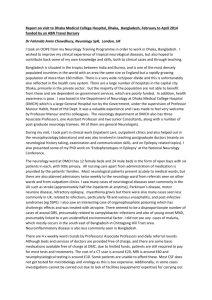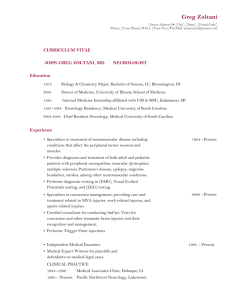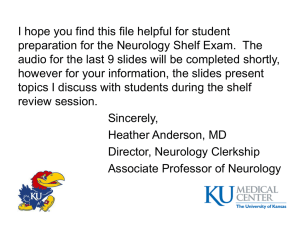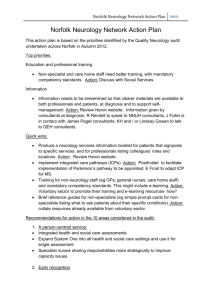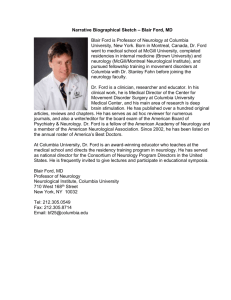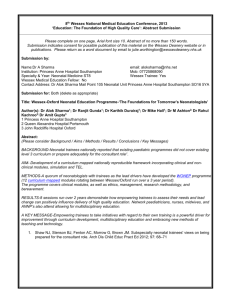Southampton/Poole Rotation
advertisement
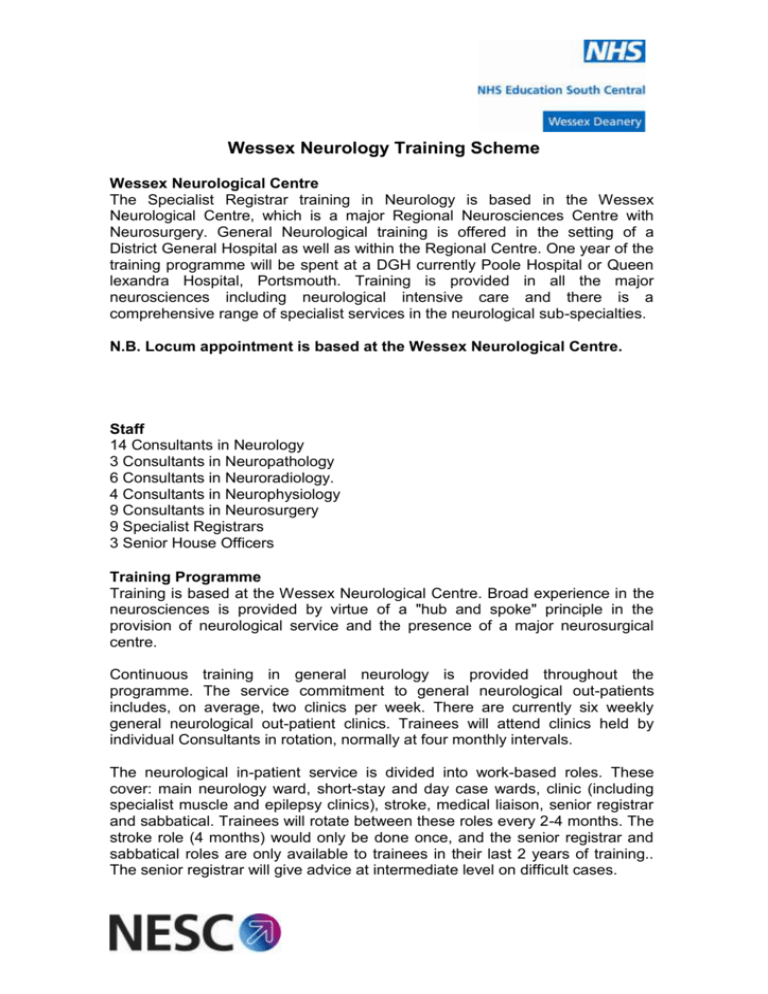
Wessex Neurology Training Scheme Wessex Neurological Centre The Specialist Registrar training in Neurology is based in the Wessex Neurological Centre, which is a major Regional Neurosciences Centre with Neurosurgery. General Neurological training is offered in the setting of a District General Hospital as well as within the Regional Centre. One year of the training programme will be spent at a DGH currently Poole Hospital or Queen lexandra Hospital, Portsmouth. Training is provided in all the major neurosciences including neurological intensive care and there is a comprehensive range of specialist services in the neurological sub-specialties. N.B. Locum appointment is based at the Wessex Neurological Centre. Staff 14 Consultants in Neurology 3 Consultants in Neuropathology 6 Consultants in Neuroradiology. 4 Consultants in Neurophysiology 9 Consultants in Neurosurgery 9 Specialist Registrars 3 Senior House Officers Training Programme Training is based at the Wessex Neurological Centre. Broad experience in the neurosciences is provided by virtue of a "hub and spoke" principle in the provision of neurological service and the presence of a major neurosurgical centre. Continuous training in general neurology is provided throughout the programme. The service commitment to general neurological out-patients includes, on average, two clinics per week. There are currently six weekly general neurological out-patient clinics. Trainees will attend clinics held by individual Consultants in rotation, normally at four monthly intervals. The neurological in-patient service is divided into work-based roles. These cover: main neurology ward, short-stay and day case wards, clinic (including specialist muscle and epilepsy clinics), stroke, medical liaison, senior registrar and sabbatical. Trainees will rotate between these roles every 2-4 months. The stroke role (4 months) would only be done once, and the senior registrar and sabbatical roles are only available to trainees in their last 2 years of training.. The senior registrar will give advice at intermediate level on difficult cases. In certain sub-specialties continuous training is given throughout the programme. In particular, trainees attend weekly meetings in neuroradiology and have regular exposure to neuropathology and neuro-physiology. Continuous training is provided in the neurosciences at the weekly combined neurosciences half-day meetings. Trainees are expected to present cases at grand rounds and to attend presentations in research and by visiting speakers. The programme includes presentations in paediatric neurology. Trainees will be involved in audit throughout the programme and expected to present their results at the academic half-day meeting. In addition to training in general neurology, the programme allows for career development on a year by year basis : (a) Attachment to sub-specialties including neurophysiology, neurosurgery and neurorehabilitation; (b) Increasing clinical responsibility for the provision of a ward referral service within the Southampton University Hospitals NHS Trust. (c) A sabbatical period in the last 2 years of training. Within small specialties such as neurology "bunching" of trainees may occur within the separate years of the programme. The yearly programme outlined below is, therefore, a guide and flexibility may be required, particularly between years 1 and 2 and years 3 and 4. A programme of organised neurology curriculum teaching has been arranged through the Wessex Courses Centre in the Postgraduate Dean's Office. There are monthly sessions which are attended by Specialist Registrars from Oxford and Southampton. The course follows the National Curriculum of the ABN and takes place in Southampton or Oxford alternately. Subspecialty Training and Career Development One year of the training programme will be spent at Poole Hospital or Queen Alexandra Hospital, Portsmouth with weekly attendance at the academic half-day and participation in the on-call rota at Southampton. An attachment to neurophysiology while at the DGH will be equivalent to a weekly half-day basis to gain experience in EEG reporting and the techniques of nerve conduction study and EMG. Trainees will be expected to provide a ward referral service within the Neurological Centre and the Southampton University Hospitals under consultant supervision (medical liaison role). Attachments will initially be available to specialist out-patient clinics in the following. (a) Vascular disease (b) Movement disorder, including the technique for Botulinum toxin injection (c) Cognitive disorders (d) Neurogenetics (e) Peripheral nerve (f) Multiple Sclerosis (g) Epilepsy (h) Myasthenia (i) Muscle disease Attachments to specialist clinics will be for training purposes primarily and it is not envisaged that there will be continuous attachment for service commitment. During the year, attendance at the muscle and epilepsy specialist clinic will be expected during the clinic attachment. All registrars will be trained in the technique of giving Botulinum toxin injections and will participate in the monthly Friday morning clinics. During training registrars can also expect: (a) An attachment in neurological rehabilitation. (b) Attendance at neuroradiological procedures including angiography and neurophysiological procedures including evoked potentials, EEG and EMG. (c) Attendance in theatre for neurosurgical procedures on appropriate cases. The programme may lead to recommendation of trainees for the award of a CCT after 4 years. It may, however, be appropriate for training to continue during a fifth year. Training this year is designed to be flexible according to the needs of trainees with advice from the Programme Director. Provision can be made for: (a) (b) Research/training in research methods Development of sub-specialist training Poole Hospital/QA Hospital Trainees will spend one year of training at Poole or Portsmouth Hospital. The unit provides experience in general neurology and in sub-specialty neurology, particularly in neurophysiology. Staff 4 Consultants in Neurology 2. Consultants in Neurophysiology 1 Visiting Consultants in Neurosurgery 1-2 Consultant(s) in Rehabilitation 2 Trainees in Neurology: 1 full-time Neurology F2 (Poole only) and 1 full-time SpR Advanced Neurology Attendance at two advanced courses during the four years is expected. The advanced neurology course held annually in Edinburgh is recommended. Trainees should also be expected to attend scientific meetings of the Association of British Neurologists. Assessment In addition to annual assessment by interview, trainees will be expected to enroll on e-portfolio and keep a record of the training and should include details of service commitments to out-patients and in-patients, as well as details of clinical attachments and attendance at academic meetings and courses. Teaching The Specialist Registrars are expected to take part in regular teaching of Junior Doctors and Undergraduates. They may also be asked to give occasional lectures to nurses and other paraclinical groups. Hours Junior Doctors hours are constantly under review throughout all hospitals in Wessex; on call / shift commitments are therefore subject to change. Banding arrangements may differ as individual Trusts determine rotas at local level. Full details of banding are available from the Medical Personnel Department of the relevant Trust. Emergencies The Specialist Registrar accepts that he/she will also perform duties in occasional emergencies at the request of the appropriate consultant: In consultation, where practicable, with his/her colleagues both senior and junior. It has been agreed between the profession and the department that while juniors accept that they will perform such duties, the Secretary of State stresses that additional commitments arising under this sub section are exceptional and in particular, that juniors should not be required to undertake work of this kind for prolonged periods on a regular basis. Weekly Timetable Wessex Neurological Centre, Southampton Main neurology ward registrar • clinic Thurs am • X-ray meetings = Mon / Tues at 2pm, Wed at 1:30pm and Thurs at 4pm • Daily Consultant ward rounds in the afternoons and Friday mornings • Admin / ward work Mon - Wed mornings Short-stay / day-case registrar • clinics Tues and Wed am, plus monthly Botulinum toxin clinics • X-ray meetings = Mon / Tues at 2pm, Wed at 1:30pm and Thurs at 4pm • Daily Consultant ward rounds in the afternoons and Friday mornings • Admin / ward work Mon / Thurs mornings Clinic registrar • 2 general plus 2 specialist (muscle and epilepsy) clinics per week • monthly Botulinum toxin clinics • X-ray meetings = Mon / Tues at 2pm, Wed at 1:30pm and Thurs at 4pm • Admin = afternoons Other roles include stroke, medical liaison, senior registrar and sabbatical. Poole Hospital AM General Neurological Outpatient Clinic Tuesday Ward Work Wednesday Neurosurgery/Radiology Meeting Ward Round Monday Thursday Friday PM Specialist Clinic Audits/Admin Neurology Outpatient Clinic Neurological Rehabilitation Ward Neurophysiology Round Study/Research Academic half-day (WNC) Queen Alexandra Hospital Monday Tuesday AM General Neurological Outpatient Clinic Neurophysiology PM Radiology meeting / ward referrals Ward referrals / admin Wednesday Neuro-rehabilitation Ward referrals / admin Thursday General Neurological Outpatient Clinic Ward referrals / admin Friday Study/Research Academic half-day (WNC) Visiting Visits to the Wessex Neurological Centre are welcomed and can be arranged by contacting: Dr H A Katifi Tel: 023 8079 6781 or Dr A Pinto Tel: 023 8079 6783 Visits to Poole or Portsmouth Hospital can be arranged by contacting: Dr R Gregory Tel: 01202 442225 Dr W Gibb Tel: 02392 286000 ext 3906 Pay You should be paid monthly at the rates set out in the national terms and conditions of service for hospital medical and dental staff and doctors in public health medicine and the community health service (England and Wales), “the TCS”, as amended from time to time. The payscales are reviewed annually. Current rates of pay may be viewed at [insert Deanery link and/or] http://www.nhsemployers.org/pay-conditions/pay-conditions-2339.cfm. Parttime posts will be paid pro-rata. Pay supplement Depending upon the working pattern and hours of duty you are contracted to undertake by the employer you should be paid a monthly additional pay supplement at the rates set out in paragraph 22 of the TCS. The current payscales may be viewed at http://www.nhsemployers.org/pay-conditions/payconditions-2339.cfm The pay supplement is not reckonable for NHS pension purposes. The pay supplement will be determined by the employer and should be made clear in their offer of employment and subject to monitoring. Pension You will be entitled to join or continue as a member of the NHS Pension Scheme, subject to its terms and rules, which may be amended from time to time. Further information can be viewed at http://www.nhspa.gov.uk/nhspa_site/index.htm Annual leave Your entitlement to annual leave will be up to 32 days per annum depending upon your previous service/incremental point, as set out in paragraphs 205 – 206 of the TCS. The TCS may be viewed at http://www.nhsemployers.org/pay-conditions/payconditions-467.cfm Sick pay Entitlements are outlined in paragraphs 255-240 of the TCS. Notice You will be required to give your employer and entitled to receive from them notice in accordance with paragraphs 195 – 196 of the TCS. Study leave The employer is expected to offer study leave in accordance with paragraphs 250 – 254 of the TCS. Local policy and procedure will be explained at your induction. Travel expenses The employer is expected to offer travel expenses in accordance with paragraphs 277 – 308 of the TCS for journeys incurred in performing your duties. Local policy and procedure will be explained at induction. Subsistence expenses The employer is expected to offer subsistence expenses in accordance with paragraph 311 of the TCS. Local policy and procedure will be explained at induction. Relocation expenses The employer will have a local policy for relocation expenses based on paragraphs 314 – 315 of the TCS and national guidance at http://www.nhsemployers.org/pay-conditions/pay-conditions-467.cfm. You are advised to check eligibility and confirm any entitlement with the employer before incurring any expenditure. In addition to local policy there is Deanery guidance which can be viewed on www.nesc.nhs.uk Pre-employment checks All NHS employers are required to undertake pre-employment checks. The employer will confirm their local arrangements expected to be in line with national guidance at http://www.nhsemployers.org/primary/primary-3524.cfm Professional registration It will be a requirement of employment that you have professional registration with the GMC for the duration of your employment. Health and safety All employers have a duty to protect their workers from harm. You will be advised by the employer of local policies and procedures intended to protect your health and safety and to comply with these.
